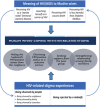Understanding stigma and coping strategies among HIV-negative Muslim wives in serodiscordant relationships in a Javanese community, Indonesia
- PMID: 37496502
- PMCID: PMC10367983
- DOI: 10.33546/bnj.1600
Understanding stigma and coping strategies among HIV-negative Muslim wives in serodiscordant relationships in a Javanese community, Indonesia
Abstract
Background: Although advanced treatment and accessibility of HIV/AIDS prevention and care have been increased, HIV-related stigma persists in the Indonesian community, especially among HIV-negative Muslim wives in a serodiscordant relationship. Therefore, understanding their coping strategies of the stigma is a necessity.
Objective: The study aimed to explore HIV-related stigma and coping strategies of HIV-negative Muslim wives in a serodiscordant relationship.
Methods: A qualitative study was conducted among seven HIV-negative Muslim wives in a serodiscordant relationship who experienced stigma. Data were collected by in-depth interview, and content analysis was used for data analysis.
Findings: Three themes emerged from the data. The first theme was the meaning of HIV/AIDS to Muslim wives, including perceiving HIV as a wanita nakal (immoral women) disease, perceiving HIV causes death, assuming herself as a carrier, and presuming HIV is less harmful than Diabetes Mellitus. The second theme was HIV-related stigma experiences, including being shunned by people, rejected by a midwife, and humiliated by a health worker. Finally, the third theme was coping strategies with the stigma, consisting of hiding the husband's HIV-positive status from the neighbors, disclosing HIV-positive status to a selective person, seeking support from the peer group, and strengthening the relationship among family members.
Conclusion: HIV/AIDS-related stigma affected people living with HIV/AIDS and their families, and it becomes a barrier to HIV/AIDS reduction programs in the marriage relationship. These findings will be beneficial to nurses and other health professionals to develop stigma reduction interventions related to HIV/AIDS.
Keywords: HIV-negative; HIV-related stigma; Indonesia; Muslim wives; marriage relationship; nursing; serodiscordant.
© The Author(s) 2021.
Conflict of interest statement
The authors declare there is no conflict of interest associated with this publication.
Figures
References
-
- Agnes Yeni, L. N., Songwathana, P., & Perngmark, P. (2020). A grounded theory study of how Muslim wives adapt to their relationships with husbands who are HIV-positive. Pacific Rim International Journal of Nursing Research, 24(2), 187-201.
-
- Agnes, Y. L. N., Songwathana, P., & Perngmark, P. (2018). Sexual negotiation for HIV prevention among Muslim married women within serodiscordant relationships in the Indonesian socio-cultural context. (Unpublished doctoral dissertation), Prince of Songkla University, Hatyai, Thailand.
-
- Anima-Korang, A., Gere, B. O., & Salimi, N. (2018). Stigma and discrimination: Coping strategies for persons living with HIV/AIDS in rural America. IAFOR Journal of Psychology & the Behavioral Sciences, 4(1), 33-44. 10.22492/ijpbs.4.1.03 - DOI
-
- Bourne, A., Owuor, J., & Dodds, C. (2017). Intimacy, support and social connectivity: Experiences of HIV serodiscordant relationships among black African people living in England. In A. Persson & S. D. Hughes (Eds.), Cross-cultural perspectives on couples with mixed HIV status: Beyond positive/negative (pp. 111-124). Switzerland: Springer.
LinkOut - more resources
Full Text Sources


